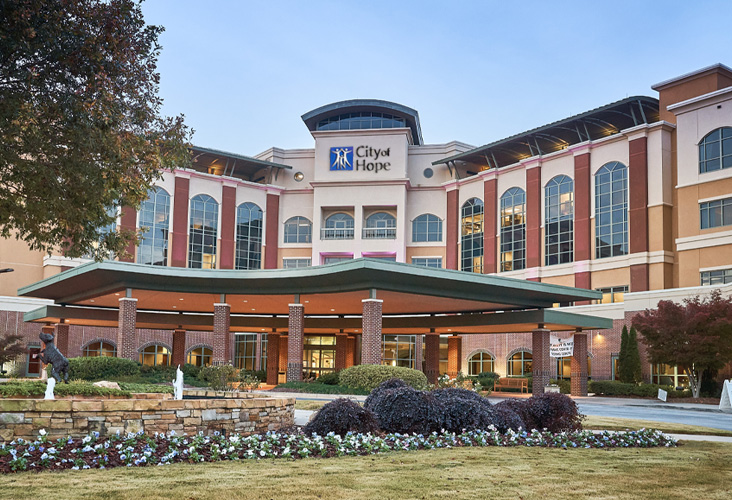

The Department of Genetics at City of Hope Cancer Center Atlanta offers cancer genetics education, genetic counseling and genetic testing. Our genetics program strives to address questions patients have about inherited predispositions that may contribute to their cancer.
All cancer is rooted in genetics. Cancer is triggered by mutations (changes) in the genes of a cell that result in uncontrolled, abnormal cell growth.
Cancer most often develops as a result of a combination of gene mutations influenced by environmental and/or lifestyle factors. Gene mutations occur as we age. Some mutations are repaired, and some are not. Most people who develop cancer are over age 50, since it takes many years for mutations to develop into cancer.
Some families have gene mutations that are passed down from one generation to the next. Members of these families may inherit a mutation in a very important gene that is present at birth and in every cell in the body. It’s important to note that people who inherit a gene mutation don’t inherit cancer, but inherit an increased risk of developing cancer. Not everyone who is born with a gene mutation will develop cancer.
Individuals who have inherited a mutation in a cancer susceptibility gene have a greater-than-average risk of developing certain cancers. Patients whose cancer is due to an inherited mutation also have an increased risk of developing a second cancer. The goal of our Cancer Genetics Program is to identify these patients and provide options to reduce the risk of getting another cancer.
Our Cancer Genetics Program may help you determine if your cancer was due to an inherited gene mutation and if you are at an increased risk of developing a second cancer. Our program has three components: genetics education, genetics counseling and genetic testing. You will learn about the role of genes and heredity in the development of cancer and which of your family members may be affected.
The program includes:
During your initial evaluation at the hospital, you will learn about the role that genes and heredity play in the development of cancer, and how it may relate to your situation.
You will complete a family history questionnaire, which includes questions regarding your personal and family history of cancer. This information will help determine if you are a candidate for genetic testing.
Following are some common signs of a hereditary cancer predisposition:
If your personal and family history merits an introductory genetics education session, you can then decide whether you would like to pursue genetic counseling and testing.
Genetic testing consists of a mouthwash or blood test. Analysis of the sample can determine if you inherited a gene mutation that contributed to your cancer diagnosis. Genetic testing might also help determine if you are at greater risk of developing the same cancer again or of developing another type of cancer.
Before and after genetic testing, you will have a counseling session. During this time, we will help simplify the complex concepts into terms you can understand. The goal is to provide clear information about genetic risk factors and address your questions and concerns. Participating in an introductory education session does not obligate you to have genetic testing.
If you wish to pursue genetic counseling and testing once you leave the hospital, we will try to help you find someone close to home.
Genetic testing may help you make informed decisions about how to manage future cancer risks. For example, if it’s determined that you have a greater-than-average risk for breast cancer recurrence, we may recommend adding breast MRIs to your routine breast cancer screenings.
If you are a woman with breast cancer and you find out that you have an inherited risk, you may be at an increased risk for developing ovarian cancer. We will present you with options to reduce that risk.
The test results can help your City of Hope doctor develop a personalized care plan. Test results can also be of great value to family members.
Genetic testing poses psychological benefits and risks. A negative result can bring a sense of relief and reduce some of your worry and anxiety. It may also eliminate the need for more frequent checkups and tests that are routine in individuals with a high risk of cancer.
A positive result can help relieve uncertainty and help you take steps to reduce the risk of recurrence or of developing another cancer. At the same time, a positive result can also cause anxiety. You may experience feelings of guilt if you learn that you are positive for a gene mutation that you passed to your offspring.
However, it’s important to remember that testing positive for a gene mutation is not a guarantee of developing cancer. Some people who test positive for a mutation never develop cancer.
Your entire care team is available to address the dimensions of genetic testing. For instance, the behavioral health and pastoral care teams can help you cope psychologically with the results of genetic testing. The nutrition team can also help you maintain your nutritional well-being to boost your immune system and reduce the risk of recurrence.
Together with other clinical departments, the Department of Genetics will educate, counsel, support and empower you throughout your cancer journey.
